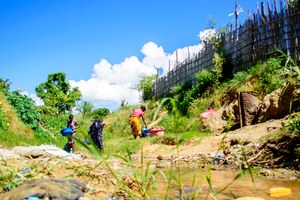The 2030 Agenda in Mozambique
It is much expected that municipalities and local governments must work towards localizing the Agenda 2030 and integrating it in local policy making. With the support from European Union, the project is also being implemented in other municipalities in Europe.
Mozambique area is 801,590 Km2. Coastline: 2470 Km. Population: 28,861,863 (2017 census non-published). 1/3 of the pop. lives in urban areas. 60% of the pop lives along the coast. 70% of the population lives in slums. The economy is dominated by agriculture; It also has large mineral deposits. GDP 3.7% in 2017. GDP per capita 382 USD 2016 as more that 55% of people living below poverty line. 3rd among most vulnerable African countries; 7 of 11 major cities are along the coast. Multi-party democracy under a constitution; Executive, judiciary and legislative branches; 53 Municipalities - 23 cities and 30 towns. Local governments are autonomous regarding to state power without prejudice to national interests and the State participation and with own representative parts; LAs attributions transferred gradually in accordance with the financial capacity to carry out the tasks assigned to it; Constitutional amendment for decentralization ongoing (2019). Capital city of Cabo Delgado Province, covered by Indian Ocean along 30 km on direct line. Largest Bay in Africa and the 3rd in the world. Population – 201,846 (2017) mostly young, at a growth rate of 8.7%. Area – 194 km2 divided in 13 districts. Non urbanized (including slums) - 50%. In process of urbanization – 20%. Amount of land urbanized – 30%. Economy mostly based on tourism, fishing and retail trade.
A fast-changing socio-economic context: Public and private investments have declined affecting livelihoods and lives. Most of the people are illiterate and have limited understanding of global issues. Prevailing poverty: competing priorities, to deal with long term adaptation needs and immediate survival needs. Limited institutional capacity: The municipalities capacity to absorb new tools and approach is also limited and include staff capacity, staff turnover, shortage of resources just to mention a few.
The Government of Mozambique is working with United Nations Development Programme and the Junta de Andalucia to help the process of localizing SDGs in Mozambique. The objective is to build and maintain partnerships and linkages with local governments and associations, actors of decentralized cooperation, private sector and other local actors. The National Association of Mozambican Municipalities is also part of a project with the Government of Mozambique aimed at localizing the SDGs.
Cabo Delgado Province has been in the center of attention recently by many development and cooperation actors due to natural disasters, such as Cyclone Kenneth, cholera epidemics and reports of extreme violence besides low indexes of human and economic development. Not to mention the recent discovery of natural fields of gas in Rovuma Basin and its potential for development.
In this context, it is yet to establish the main strategic lines as well as the functions and responsibilities of the different actors. What we all know is that since 25 of September 2015 four years have passed and very little has been achieved.
Pemba Municipality has proposed to increase the engagement of citizens and local communities and develop their sense of ownership of the UN Agenda 2030 and their participation in the achievement of the SDGs at local level through awareness-raising activities. This is also done by giving the opportunity and the capability to ordinary people to participate in the achievement of the goals in their daily lives, suggesting them simple but crucial daily attitudes and tasks such as tree planting, cleaning up etc. The key action also includes the involvement of all local stakeholders in the formulation of the awareness strategy, the advocacy plan and the evaluation of its impact.
In order to celebrate the fourth anniversary, Pemba Municipality carried out activities for awareness, accountability and impact. The awareness actions included: Public meetings with government officials and village leaders; Presentations in primary schools under the City Council management and at the Secondary School of Pemba; 2 debates on local radio. The accountability actions included: 1 research on the knowledge of SDGs. The impact actions included: Identification of the most challenging environmental problems at the local level; World Clean- up – getting rid of plastic bags on 21 September; and tree planting.
To sum up, the project Shaping Fair Cities have been creating space of dialogue and expertise on Agenda 2030. Pemba City is a leading municipality in localising the SDGs. For 2020, Pemba City Plan will be in line with all SDGs. Thus, all activities will be linked to one SDG.

